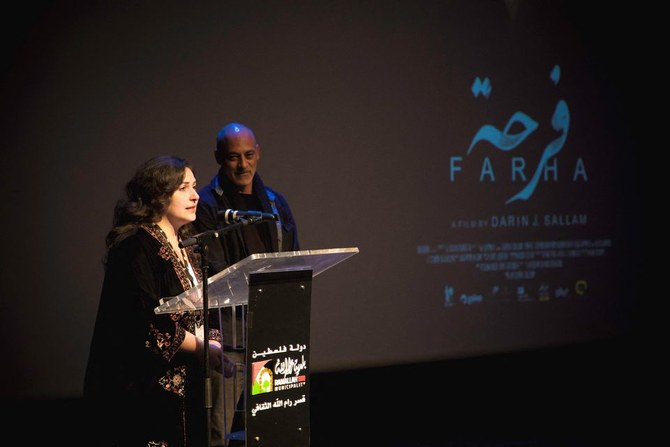RAMALLAH: Palestinians are defending the newly released movie “Farha” following an Israeli backlash against the film’s depiction of events in 1948.
As Netflix faces criticism for airing the film, activists advocating the Palestinian cause are taking the initiative to support its release.
The Jordanian film depicts the ethnic cleansing of Palestinians in 1948, known as the Nakba.
Screening of the film has caused widespread Israeli anger with threats to cancel Netflix subscriptions.
Israeli ministers and officials have accused the film’s creators of promoting a false narrative and inciting violence against Israeli soldiers.
The movie, directed by Darin J. Sallam, a Jordanian woman of Palestinian origin, tells the story of a 14-year-old Palestinian girl who witnesses the murder of her entire family, including an infant, when Israeli militias overrun her village and execute civilians during the Nakba. The girl dreams of moving from her Palestinian village to the city to continue her education.
The village’s exposure to the invasion prompts the girl’s father to hide her in a small room, and her life changes dramatically in a matter of days.
The film, inspired by real events, was shown at the Toronto International Film Festival in 2021.
Jordan chose “Farha” to represent it in the Oscar for Best Foreign Film award during the next edition of the world’s premiere film event.
The film was launched on Netflix on Dec. 1.
Israeli officials claim that Farha “presents a false narrative” about the Nakba, in which 760,000 Palestinians were expelled from their homelands.
Prominent Palestinian poet and writer Mutwakel Taha told Arab News that the reason for the Israeli anger was because the country’s actions in the Nakba had been exposed to the world through the film.
“They want to monopolize the victim image alone. So their madness is because the Palestinians appear as victims of the Israelis,” Taha told Arab News.
Taha said that Palestinians are betting on cultural solutions after the failure of efforts to reach a political settlement with Israel.
A Palestinian narrative of events during the Nakba frightens Israeli, said Taha.
Palestinian writer Tahsin Yaqeen agreed.
Yaqeen told Arab News that Israel considers every artistic or literary work from the side of Palestine as an attack, adding that Israel’s narrative had been challenged and undermined through the work of Israeli historians such as Ilan Pappe.
Shlomo Sand, another prominent historian who has questioned Israel’s actions, has also challenged prominent narratives, Yaqeen said, adding: “We do not need as Palestinians to explain what happened in 1948 and before and after that, because the world knows very well what happened.”
Israelis should view “Farha” and listen to the stories of Palestinians, even if they do not agree, said Yaqeen.
The writer asked: “If the Israelis are not believing what is narrated by the ‘Farha’ film, would they not ask themselves today, what is their government and army doing in the West Bank?”
Yaqeen said that the Israeli reaction to the film was based on “a national rejection because it violated the Israeli narrative.
“It is not artistic criticism of the film’s narrative.”
Sireen Jabarin, an Israeli-Arab activist from Umm Al-Fahm, told Arab News: “Israeli authorities limiting freedom of art is not new, but, interestingly, the Israeli policies in this direction are tending toward racism and extremism and not accepting the narration of the other party, and even rejecting any action that explains the truth to the Palestinians about what happened decades ago.”
An Israeli intellectual who opposes the release of “Farha” told Arab News: “Netflix is a global network and has many subscribers in Israel. Hundreds, perhaps thousands, of Israeli subscribers have canceled their subscriptions to Netflix during the past few days in protest of its marketing of the Jordanian film ‘Farha,’ which lacks balance and objectivity, and neglects to mention the Israeli point of view.”
Israeli Finance Minister Avigdor Lieberman denounced the release of the film.
Lieberman said: “It is insane that Netflix decided to broadcast a film whose sole purpose is to present a false claim and incite against Israeli soldiers.”
Lieberman added: “We will not allow the reputation of Israeli army soldiers to be tarnished.”
The minister said that he had directed the leadership at the Ministry of Finance to take measures to withdraw the budget of the Jaffa Theater, which chose to screen the film.
Israeli Culture Minister Hili Tropper said that the screening of the film in Israeli cinemas was a “shame,” adding that “Farha” promotes “lies and slander.”
Darin J. Sallam and producers Dima Azar and Aya Jardaneh condemned criticism of the film.
They criticized a social media campaign targeting the film’s rating on IMDb, attempts to stop the screening of the film at Jaffa Theater and threats to cancel Netflix subscriptions.
They also condemned hate messages, harassment, accusations and bullying on social media.
The trio said that they would not tolerate any harmful threats against any member of the “Farha” team.
“These attempts to silence Arab women and filmmakers is a stripping of humanity and freedom of expression,” they said.
“The film’s existence is a reality, and our existence is a reality. We have been robbed of a lot, but our voices will not be taken away.”
Azar and Jardaneh stressed their support for Sallam’s decision to “tell this human and personal story, and share it with the world, and to realize this creative vision cinematically without any restrictions.”












